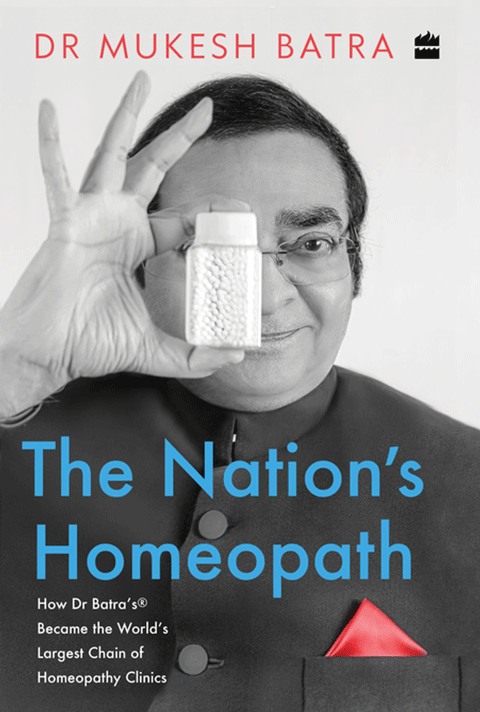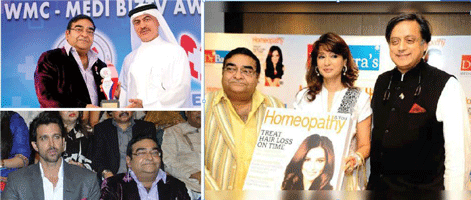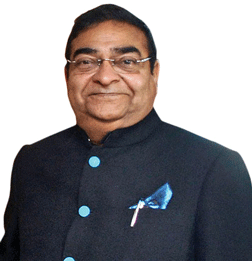The fascinating life and times of the India’s most celebrated homeopath, Padma Shri Dr Mukesh Batra, are worth reading. Here in his autobiography titled `The Nation’s Homeopath’ there are aspirational real life stories in a class of their own. The autobiography, put together painstakingly, offers wonderful insight into the adventures and misadventures of an entrepreneurial spirit, also cameo anecdotes about a host of Hindi cinema icons who became his clients…there is much else to keep one reading, for this is first person storytelling as also a poignant document of heartaches, valiant failures – but for the most part how in the end every little effort counted and yielded results material and immaterial. You want to read this autobiography!
THE CHARMED AND BLESSED DR MUKESH BATRA!
Here are the aspirational memoirs of the country’s most recognized homeopath….
MOST society people in India would recognize Dr Mukesh Batra as the man who popularized modern Homeopathy in and out of India at a time when the alternative medicine system was not very well understood. To Dr Mukesh Batra goes the credit for bringing back Homeopathy on the main stage of healthcare and although he has written several books, his much awaited autobiography titled `The Nation’s Homeopath’ was unveiled as an online event on social media on July 15, 2021.
The book has been published by HarperCollins Publishers India and was unveiled in the presence of Rajiv Bajaj (MD, Bajaj Auto) with vivacious celebrity anchor Simran Ahuja doing the honors of presentation, along with Akshay Bhatra who walks in his father’s celebrated footsteps. Consulting Editor of ‘Business India’ Suman Tarafdar was also present at the event.
Speaking at the event the Dr Mukesh Batra observed that Homeopathy can change people’s life for the better healthwise. His autobiography is an aspirational story about a young man fond of dreaming on the balcony, who later on moved up from his one-room Homeopathy clinic to become a successful homeopath to film celebrities, politicians and the upper crust of Bollywood and business society. Not to forget the chain of Dr Batra clinics he established across the country and abroad, with his own Homeopathy-based beauty products.
Speaking at the virtual event Padma Shri Dr Mukesh Batra confessed he has lived a charmed and blessed life despite the ups and downs of personal heartaches and challenges which came his way. Most of it is all there in his book of memoirs which details his experiences as a homeopathy professional as well as an entrepreneur, “The reader will get a ringside view of the mistakes I’ve made and how I converted challenges into opportunities and failures into success.”
Get the book, catch up with the life and times of an iconic humble humanitarian, Dr Mukesh Batra! Interestingly, he says Homeopathy is the second largest system of medicine and healthcare practiced around the world and his book offers as much insight into his life as serves as a friendly guidebook for those who would like to study the alternate medicine and healthcare systems of the world. —Pankajbala R Patel
Excerpts from ‘The Nation’s Homeopath’ by Dr Mukesh Batra…
- A Homeopath Is Born

MY story begins in the blood-and-tears-soaked backdrop of World War II, the global nightmare that lasted six years, killing close to fifty million people and displacing millions of others. Rat-a-tat gunfire and exploding bombs, severed limbs and flattened cities, and an absence of anything life-affirming, defined those years. There was no home untouched by the war, including that of my maternal grandfather, Baburao Sirpal – a man who played a pivotal role in my life. We called him Papaji.
Papaji was a tall, slim and handsome man who brooked no nonsense. He owned the largest sports goods store in Rangoon, Burma. It was common then for Indians to move to Burma for a better life. The country was beautiful, bursting with tropical verdancy punctuated by golden domes of pagodas, and with bountiful markets by rivers like the Irrawaddy. The people were gentle and peace-loving.
A Burma was under British rule, Indian Anglicized their names. Thus, Baburao Siurpal, Papaji, became B.R. Sir Paul, just as Makkad changed to Maker and Kakkar to Kaicker. Only my grandmother remained Durga, inappropriately, as she was always dressed in a white sari and was short and frail.
Papaji, though strict, lavished attention on his daughters. My mother, Kaushalya or Mary, grew up with a convent education, wore a longyi like Aung San Suu Kyi and spent her vacations at the family’s sprawling weekend home in Mandalay, Burma’s second important city. My mother always spoke fondly about their Mandalay visits. On her eighteenth birthday, Papaji gifted her with a Cadillac, which she crashed on her first drive out.
It was a happy and affluent family life until 1942, when the Japanese came a-calling as a fall out of World War II. Like an ostrich with its head buried in the sand, Papaji did not take the invasion seriously, thinking that his wealth and contacts would protect him. It was only when Japanese tanks rumbled down the streets and the city began to empty that he realized that he, too, had to flee to India. What was still busy and bustling was the port, where the last ship was getting ready to sail.

Papaji packed as many family valuables as he could into large steel trunks and brought them to the docks. He bought first-class tickets for the family – look at the pride and optimism! – while there were still a few hours for departure. At the docks, the loaders, taking advantage of the situation, asked for Rs100 per trunk. Papaji blew a fuse. A hundred bucks in the 1940s was perhaps equivalent to Rs10,000 in today’s value.I have so many servants at home,’ he hollered. `I don’t need you guys. I’ll call my staff from home to load.”
However, pandemonium at the docks increased. The throngs, shoving and screaming, their survival at stake, started forcing themselves on to the ship regardless of whether they had a ticket or not. And then well before the official departure time, the ship hooted its last call. Punctuality is not a priority when a city is under attack. Papaji and his family were pushed aboard just as the ship withdrew the gangway to set off on its twenty-four hour journey to India.
On board there was mayhem. Papaji and his family could not even get a cabin, forget a first-class one. They lay on the floor of the cold, open deck with no blankets and with hundreds of other people crying around them. Imagine leaving behind your life’s earnings in a city fading in the distance, together with all the happy memories, including a Cadillac that would never again unite with its original, longyi-wearing owner.
The voyage from Rangoon to Sialkot was a long one for Papaji and his family, and not the last odyssey either. After the ship took them to Chennai (then Madras), they took a train all the way up and west to Sialkot, as it was a hub for the sports goods industry. Papaji built his business up again – rupee by rupee – in undivided India. But there was more pain and displacement to come.
It came to light that Papaji’s sister had not made it to the ship in Rangoon. Having to fend for herself, she had wrapped all her jewelry around her body, under her clothes, and walked. She walked from Burma to Amritsar through Bangladesh (then East Pakistan). Her feet were shredded by the time she reached Punjab.
Then Partition happened. Papaji and his family walked thousands of miles from Sialkot to the newly carved Indian territories. Along the way they saw people being slaughtered, they saw babies and children crying, and so much other suffering. The family made it to Delhi.
My mother eventually studied medicine at lady Hardinge Medical college and moved to Lucknow know after marrying my dad, Dr M.C. Batra, a homeopath. Papaji settled in Agra and built his life from scratch for the third time, this instance with a leather goods business. First sports and now leather, both demanding resilience and toil, were apt metaphors for my grandfather’s life.
And on 1 July, 1951, I was born in Lucknow, the son of a mother who was an allopathic doctor and father who was a homeopath, making me a product to mixopathy.Actor Calling Doctor
16 Actor Calling Doctor
I RECKON some of you who are reading this book are young people. You want to make something of your lives. Let me tell you one thing. If you are asked to write something, or speak somewhere, do it.
You may wonder about the point of it. So many people are writing and speaking, what’s your two pennies’ worth going to achieve? You imagine it will sink into the vast sea of content, and lie ignored on the ocean floor, next to the wreckage of the Titanic. But words once spoken or penned are always alive. And there may be some influential person who likes what you said, salvages it from the bottom of the sea and gives your career a shot in the arm.
In 1974, when I had just gotten married and started my practice, I became friends with Sangeeta, the daughter of Madan Mohan, the music director of classics like Lag ja gale’ andRuke ruke se kadam.’ Sangeeta worked for Eve’s Weekly, the women’s magazine.
Sangeeta’s mother was a patient of my father’s, while I treated Sangeeta. Happy with the results, she once said to me, Doc, you have taken good care of me. I’m going to ask my editor if you can write an article on homeopathy for Eve’s Weekly.’ The magazine’s editor, however, was not so keen on a piece on homeopathy. Sangeeta then referred me to another publication in the same stable. It was called Mirror. I would describe it as a young person’s Reader’s Digest. It was a monthly edited by a man called Rajan Narayan. The Eve’s Weekly editor was a fashionable and beautiful woman. Rajan was the quintessential jholawala journalist, but there was no doubting his intelligence. And he knew what he wanted. Despite his forbidding appearance, he did not reject the idea of apiece on homeopathy outright. He asked me to give it a shot. When I took the first draft to him after a few days, Rajan went through it and, with a basketball pro’s skill, tossed it into the waste-paper basket. Thereon, multiple drafts received the same welcome. I was disappointed, but also entertained. One day I almost suggested to Rajan that he should be playing with NBA stars instead of being at the Mirror. Jokes aside, I did not let his rejections break me. After all, even all, even best-selling author J.K. Rowling was rejected twelve times! That’s a lesson for young folk. Don’t give up so easily. Keep trying. I kept coming back with a smile and a new draft. Eventually, he took a liking to me and also the article. It was published under the headlineA Homeopath is Not a Quack.’
Some days after the piece appeared, I was at home when the phone rang.
IN a deep growl, the caller asked, Am I speaking to Dr Mukesh Batra?’ When I replied in the affirmative, he asked,Am I speaking to the author of “A Homeopath Is Not A Quack?” I said, Yes. This is Manoj Kumar speaking,’ the caller said. I put the phone down. Manoj Kumar, the film star whose Roti Kapda Aur Makaan was 1974’s biggest hit? Whose stature was as big as Dilip Kumar’s? This had to be a prank. And I, the smart Dr Batra, had refused to fall for it.
After a few minutes the phone rang again. He must have known what was happening and this time he pre-empted me by saying it was truly him, `Bhai mai sach mey Manoj Kumar bol raha hu. I want to consult you.’
This time I believed him, and gave him my address. Once I put the phone down, however, I was in a tizzy. The article did not have my picture, just my name, Manoj Kumar probably thought I was a senior doctor when the reality was that I was a rookie, twenty-two years old, with barely any patients. And now this towering film star was on his way to my house-cum-clinic. At least I had the dispenser with me, so my surroundings looked a bit professional.
I had a certain image of him and vice versa, and the first few moments after Manoj Kumar entered our apartment at Land’s End were spent aligning the perception with the reality. Once the ice was broken though, we realized both of us had a passion for homeopathy. In fact, Manoj Kumar, Ashok Kumar and Salim Khan were practitioners of homeopathy in Bollywood that time. They also used to dispense medicines.
Manoj Kumar and I hit it off. He began to treat me like a younger brother. In the following years, I spent many hours at his home in Juhu talking medicine, movies and eating vegetarian food sitting on the floor. He never sat at a table, even though his home was well furnished. And the other thing he rarely did was fly. He had a phobia of flights. So if he had to go to Delhi, he would book a first-class ticket on the Rajdhani.
My proximity to Manoj Kumar brought more film folk to my door for treatment. The man known for his signature move of partially covering his face with his palm put me in the spotlight and on the radar in Bollywood, a choosy club that does not easily allow outsiders past its gilded gates.
65. A Life Well Lived
SEVENTY years of existence on this planet teaches you a lot. I have dotted this book with lessons that readers and professionals can benefit from. And in this chapter, I will encapsulate the various things I have learnt from life.
- Aim big, aim to make a difference: Listen to your instinct. Sachin Tendulkar, Virat Kohli and M.S. Dhoni were all middle-class kids. But they realized that they had a talent for hitting a cricket ball better than most. And then they worked hard at it. Stop seeing dreams as something abstact and unachievable. With the right tools and attitude, they can become a reality.
- Leave behind a legacy: Be a pioneer. There was a time when, at parties, people would hastily end the conversation when they found out I was a homeopath, and not an MBBS doctor. I went on to set up a brand and grow it, and put homeopathy on the map. We have our critics, but it is fair to say we wouldn’t be where we are today without merit.
- Lead a values-based life and inspire others to be truthful: Ideas create, values protect. Don’t glamorize jugaad (makeshift work). It is a culture encouraged by the mediocre and the crooked. It may help you in the short term, but in the long run, your produce and Indian business practices will be shown in poor light. Yes, you will make mistakes. At such times, it’s best to own up to them. Remember, this is a world of social media and online reviews. Dishonesty can be flashed in seconds to a global audience.
- Build multilevel leadership and understand the real meaning of leadership: Leadership goes beyond just a fancy office and speeches. Leadership means you are always being watched. Hundreds of employees will base their value system upon how you conduct yourself and the decisions you take, especially in a pressure situation. As for multilevel leadership, it will bring out leadership qualities in others, and they will always be thankful to you for that. You will be seen as someone without insecurity, and it will also help you ease some of your own work burden.
- Trust but not blindly: The world does have devious people, and not all of them are in Nigeria sending scam emails. Some of them are right there in your company. Beware of their intentions, especially when you are successful. Never show all your cards to anyone. Learn to see red flags. If someone is selling you a story that seems too good to be true, it probably is. Do your own independent homework on a matter before committing your name or money to it.
- Innovate: It will keep you ahead of the game. We were the first to have computer data and blister-packed medicines. At the same time, the timing of innovation is critical. It should be done when your existing range is stable, and when there is a need in the market for it. Do not launch a range of sunscreen in Cherrapunji.
- Put your money where your mouth is: If you say all the right things about providing employee benefits to impress your friends or the media, but fail to actually do what you have said, you will lose the respect of your workforce and the corporate world in general.
- Create not just profit but also goodwill: there will be financial highs and lows. But goodwill can set you apart from your competitor. In our company, we take care of the underprivileged and the less fortunate. Their blessings keep us protected and their prayers help us grow.
- Be prepared for crisis and conflict management: Enrepreneurship can be first-class travel and champagne one moment, trench warfare the next. You will need a mix of patience, aggression and quick thinking to resolve matters. When Covid broke out, we sent computers to our doctors’ homes and started video-calling our patients within days. Soon we were doing up to 1,000 e-consultations a day a day. It was an unprecedented time and calamity, and we hit the ground running.
